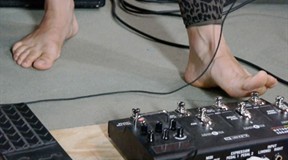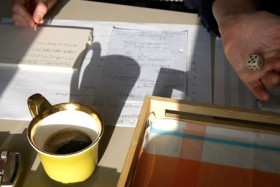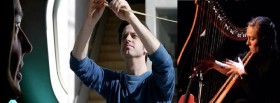På fotografiet er instruktøren på optagelser i en by i Tyrkiet, hvis navn hun og den medvirkende Eva Noer Kondrup øver sig i at udtale. Kondrup fotograferer instruktøren, som til sin films tredje sats skildrer komponisten Kondrup i hendes opsøgen en særlig kultur med kniplingekunst, kvinders kunst. Kniplingernes tråde omdanner Kondrup i sit kompositionsarbejde til musikforløb i den strygekvartet, hun arbejder på. Der er senere en smuk scene hjemme i arbejdsværelset, hvor hun tager sin egen kniplingesamling frem, og jeg tænker med ét på Malte Laurids Brigge som barn, i en tilsvarende scene i Rilkes roman, et sammenfald i min erindring, som vokser sig så manifest, at jeg ikke vil slippe det, selv om det jo ikke er godt med private associationer i anmeldelser. Så jeg læser det alligevel ind i min læsning af filmen, dette sted hos Rilke:
”… ’Skal vi se dem Malte, ’ sagde hun og glædede sig, som om hun skulle have alt det forærende, der lå i den lille, gullakerede skuffe. Og så kunne hun af lutter forventning slet ikke pakke silkepapiret op. Det måtte jeg altid gøre. Men også jeg blev helt ivrig, når kniplingerne kom til syne. De var vundne om en trærulle, der slet ikke mere var at se for bar kniplinger. Og nu viklede vi dem langsomt op og så på mønstrene, hvordan de forløb, og blev altid lidt foskrækkede, når et stykke var ude. De hørte så pludseligt op.”
Henriette Groth, den første af de tre komponister, jeg møder i filmen, altså i dens første sats, siger, hun i sit arbejde vil fremkalde noget, som ikke findes. Som altså herefter findes, og mon ikke hun også som knipleskerne forsvinder ind i sit værk og bliver der? Jeg tror, det er hvad filmen handler om. De bare fødder på gulvet mellem det elektriske værktøjs kabler, pedaler og kontakter, bevæger sig i deres egen dans på vej til musikken, til sangen, som er på fremkaldelse efter en impuls fra værkstedets omverden, som et You Tube klip for eksempel.

Simon Steen-Andersens arbejde udgør næste afsnit, altså 2. sats i Bach Jensens komposition. Han ser sådan på det, at musikstykket, han komponerer, at på grund af dets materiale kommer det til at eksistere som noget særligt i verden. Dertil kommer så det visuelle, han vil tilføje, en video, som udvider musikken. Steen-Andersen arbejder i et senere afsnit på stedet for installationen som nu er hans musikalske værk. Han kommer med sig selv og en golfkugle til Det Kongelige Bibibliotek. Det er hvad han tilfører stedet. Han vil integrere arkitekturen og genstandene på stedet i sin musk, skabe dem om til sin musik, som altså på en måde allerede er der, men skal vækkes ved et sindrigt arrangement, som skildres i muntre scener.Så skifter det til Eva Noer Kondrup, det er velordnet det her, en sats ad gangen gennemspilles. Hun fortæller om sin metode. Hun sidder ved nodepapiret og skriver. Det vigtige er at have tid, arbejde lidt på det, og så lidt på det, og så lidt mere på det, hele tiden, al tid. Hun arbejder med melodiens problem, forstår jeg. Flydende uregelmæssigt organiseres den ved regelbundet tilfældighed, et terningekast fastlægger, at der bliver meget få halvtonespring, men reglen må følges. Som den klassisk traditionsbundne af de tre arbejder hun på en strygekvartet, (mens de andre arbejder på en nutidig danseforestilling og en lige så nutidig opera), jeg ser nodetegnene blive omhyggeligt skrevet på nodepapiret. Tænker på en asiatisk kaligrafs langsomme omhu.
Ida Bach Jensens kamera skildrer sirligt intenst de medvirkende komponisters rum, deres arbejdsrum og jeg rammes af en bolængsel, som Barthes ved et fotografi af et hus i Sydspanien, disse ”billeder berører mig, det skyldes simpelthen, at der ville jeg gerne bo. Denne lyst udspringer af nogle rødder og når ned i nogle dybder i mig, som jeg ikke kender.” Det er ikke nysgerrighed, ikke misundelse, ikke fascination, der er simpel længsel. Og kameraet skildrer deres ting, den guldrandede tekop nødvendig for at komponere, som under researchen satte gang i det hele, fortæller Ida Bach Jensen på komponistforeningens hjemmeside: ”… Idéen til min film… opstod en vinterdag, jeg var på besøg hos Eva Noer Kondrup. Her blev mit øje fanget af en smuk gul kop. Det viste sig at være Evas komponist-kop, som hun drikker af, når hun komponerer. Dette blev startskuddet til min film.”

Der er poesi de mærkeligste steder, hedder det et sted i hendes film. Og poesien er så smukt fotograferet, så klogt klippet, med så beslutsom en vilje. Den er en af de mange film om kunstnerisk arbejde, men en af de bedste, jeg har set. Den fører mig som Malte Laurids gennem forunderlige landskaber:
”Først kom der strimler af italiensk arbejde, sejge strimler med udtrukne tråde, i hvilke alt stadig gentog sig, tydeligt som i en bondehave. Så var på engang en hel række af vore blikke tilgitrede af venezianske nålespidser, som var vi klostre eller fængsler. Men udsigten blev atter fri, og man så langt ind i haver, der stadig blev kunstigere, indtil det blev tæt og lunkent for øjnene som i et drivhus: prunkende planter, vi ikke kendte, udfoldede kæmpestore blade, ranker greb efter hinanden, som svimlede det for dem, og de store, åbne blomster i Points d’Alencon tågede alt med deres støv. Pludselig trådte man, ganske træt og ør, ud på Valenciennes lange bane, og det var vinter og tidligt på dagen og rimfrost. Og man trængte frem gennem byen Binches’ tilsneede buskads og kom ud på pladser, hvor ingen endnu havde gået; grenene hang så underligt nedadbøjede, der kunne godt være en grav under dem, men det skjulte vi for hinanden. Kulden trængte stadig tættere ind på os, og tilsist sagde Maman, når de små, ganske fine kniplngsblonder kom: ’Åh, nu får vi isblmster for øjnene, ’ og det fik vi også, for indeni os var det meget varmt…”
Hvis nu kniplingerne er partituret, hvordan er så musikken? Det er opgaven, både komponisten og filmistruktøren stiller sig. ”Det gælder om at nå frem til de dybere kulturelle lag – det er rigtig godt at undersøge”, hedder det et sted. Nodepapiret, pennene og farveblyanterne bruges til at holde rede på trådene i kniplingen på vej ind i strygekvartetten. Filmens opgave er også dette og den skal dertil holde de tre stærke og meget forskellige medvirkende ude fra hinanden, holde forskelligheder og ensheder prægnante og i balance i den fineste vægtning, og det lykkes! Derved bliver ”Komponist” i sin handling en lyrisk poetik, en filmisk kompositionslære.
Det med filmens satser, som sammen med motivet med kniplingerne har været så styrende for min oplevelse, kommer fra Thomas Michelsens anmeldelse i Politiken: ”… den rolige klipning af filmen, som i sig selv er en visuel komposition, hvor de tre komponister kommer til orde i samme rækkefælge tre gange i træk, indtil fjerde og sidste gennemspilning lader formen briste i en kulmination, der giver Henriette Groth det sidste ord om musik som magisk virkelighed.”
Jeg har svært ved at slippe filmen. Jeg tumler med den i dagevis. Mærker urolig en masse forskelligt, ved ikke ud eller ind. Vælger så at indse, at jeg måske simpelthen læser den, som Rilke lader Malte Laurids Brigge læse Mamans kniplingesamling, låner dristigt hans langt smukkere sprog og benytter hans dybe indsigt i poetik:
”Vi sukkede begge over at måtte rulle dem sammen igen, det var et langt arbejde, men vi ville ikke overlade det til andre. ’Tænk dig, hvis vi så først skulle lave dem, ’ sagde Maman og så formelig forskækket ud. Det kunne jeg slet ikke forstille mig. Jeg greb mig i at have tænkt på små dyr, der idelig spinder den slags, og som man til gengæld lader være i fred. Nej, naturligvis var det kvinder. ’De, der lavede dem, er skkert kommet i himlen, ’ mente jeg beundrende. Jeg husker, at det derved faldt mig ind, at det var længe siden, at jeg havde spurgt om himmelen. Maman åndede lettet op, kniplingerne var atter rullet sammen. En stund efter, da jeg allerede igen havde glemt det, sagde hun ganske langsomt: ’I himmelen? Jeg tror, at de er helt og holdent i dem der. Når man sådan ser dem: de kan godt være en evig salighed. Man ved jo så lidt om den. ’ ”
Danmark, 2014, 54 min.
Link til idabachjensen.dk (filmen kan bestilles her, også i engelsk version)

Simon Steen-Andersen i gang på Det Kongelige Bibliotek mellem Eva Noer Kondrup i fly til Tyrkiet for at studere kniplinger til sin strygekvartet og Henriette Groth ved sin harpe under sin danseforestilling.





